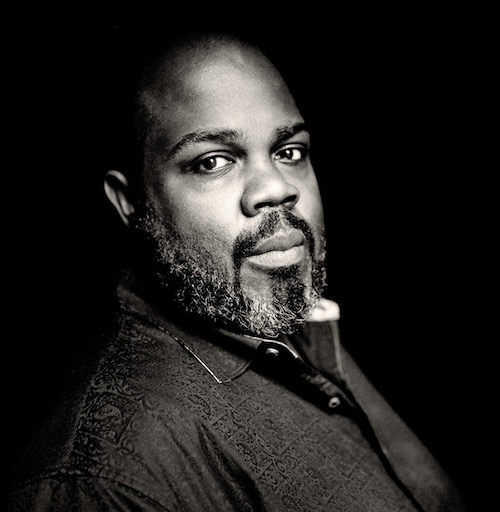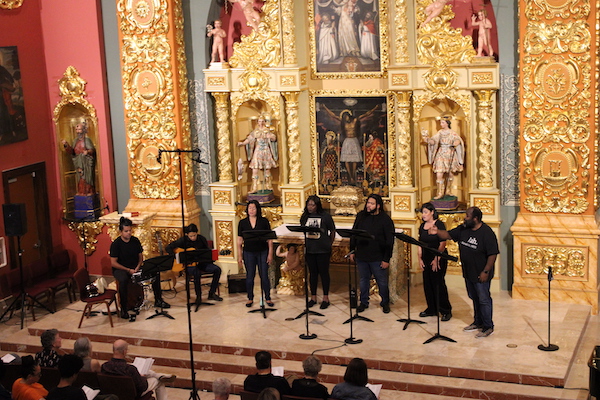Mobley and colleagues offer compelling survey of songs of freedom

Countertenor Reginald Mobley and friends performed “The Art of Protest” Friday night at Corpus Christi Church in Miami.
Music has always played a role in social movements and battles for freedom and greater equality. As a prelude to its concert season, Seraphic Fire presented “The Art of Protest: Music of American and International Struggles” Friday night in the La Merced Chapel of Corpus Christi Church in Miami’s historic Allapattah neighborhood. The superb countertenor Reginald Mobley, a Seraphic Fire alum and frequent returning guest, served as the program’s curator, host and director of the vocal contingent.
The concert opened with “I’ll Overcome Someday” by Charles Albert Tindley, sung with the vernacular immediacy of a folk hymn by Mobley, sopranos Michele Kennedy and Deborah Stephens, mezzo-soprano Gabriela Linares and tenor David Pelino. Mobley stated that music can charm, persuade and embolden its listeners in times of struggle for human rights. As an illustration, the ensemble sang a stirring version of the English national anthem “God Save the King,” followed by William Billings’” Chester” which became an anthem of protest against England’s colonial rule during the American Revolution.
The five voices soared in “My Country ‘Tis of Thee,” the cobwebs of overfamiliarity blown away in artistic director Patrick Quigley’s freshly conceived arrangement. With all four verses sung, the harmonious blending of timbres proved entrancing.
Turning to the Civil War and the fight to end slavery, the song was repeated with A. G. Duncan’s abolitionist lyrics to tremendous effect. Pelino’s powerful tenor gave forthright voice to “John Brown’s Body,” set to the melody of “The Battle Hymn of the Republic.” Koh Kazama’s guitar and Christian Reátegui’s percussion accompaniment added to the stirring pulse.
A Martin Delaney medley, arranged by Andy Clark, showcased Delaney’s gripping lyrics to melodies of Stephen Foster. Delaney (1812-1885) was a physician, Union army officer, writer, journalist and abolitionist leader. His words put an entirely new spin on such Foster standards as “Old Folks at Home” and “Oh! Susanna.” Linares’ rich mezzo was especially potent in Delaney’s potent avowal of liberation “way down upon the Mobile River.” Seraphic Fire’s trademark velvety sonority was fully evident in Quigley’s stirring arrangement of the original “Battle Hymn.”
Kennedy, Stephens and Linares had the stage to themselves for a rousing version of Eleanor Smith’s “Suffrage Song.” The campaign for the right of women to vote on both sides of the Atlantic Ocean was represented by the “March of the Women” by Ethyl Smythe, given appropriately operatic treatment. (Smythe, a British suffragette leader, was the first female composer to have an opera produced at the Met [Der Wald in 1903]). “Votes for Women,” to the tune of “Yankee Doodle,” was sung with a spirited clipped rhythm while the “Battle Hymn” appeared again with “Song of Women Free,” a real consciousness raiser.
“The Death of Emmet Till” by A.C. Bilbrew memorialized the tragic murder that launched the modern civil rights movement. Mobley’s pure intonation, the warmth and depth of Linares’ projection and Kennedy’s silvery top over the ensemble brought the song’s message forward with potent immediacy.
Stephens’ vibrant middle register and deeply felt style adorned the spiritual “O Freedom” in a subtly textured arrangement by Anthony Tracek-King. “Lift Every Voice and Sing” by Rosamond and James Weldon Johnson emerged virile in a full throated ensemble effort. “A Pesar de Usted “by Chico Buarque brought depth of feeling and sweep, lamenting Latin American suppression of freedom but offering hope for a better day.
In a seeming deviation from the program’s theme, Mobley offered a spare, intense performance of “Flow My Tears” by English Renaissance composer John Dowland. Mobley explained that civil rights leader Bayard Rustin was also a vocalist who performed and recorded a mixture of freedom songs and Elizabethan repertoire, in addition to being an important early advocate for gay rights. Beautifully accompanied by Kozama, Mobley’s distinct articulation and idiomatic affinity for this repertoire were a joy to hear.
Based on biblical psalms,” By the Rivers of Babylon” (by Brent Dowe and Trevor McNaughton) has become a gay rights anthem in many countries and was sung with an incisive edge, the trio of Kennedy, Linares and Pelino a standout. Mobley’s high range embellished the Harold Arlen classic “Over the Rainbow” in an engaging manner.
The evening concluded with “We Shall Overcome,” the civil rights anthem that evolved from “I’ll Overcome Someday,” which opened the program. Stephens’ top voice was free and open in a terrific solo. The audience joined in enthusiastically for the final verse and awarded the singers a standing ovation.
The program will be repeated 7:30 p.m. Saturday at the Lyric Theater in Miami and 3 p.m. Sunday at First United Methodist Church in Homestead. seraphicfire.org
Posted in Performances
Leave a Comment
Sat Oct 7, 2023
at 2:20 pm
No Comments




